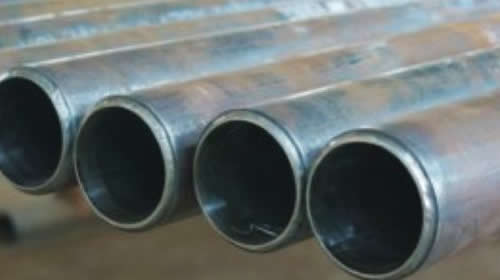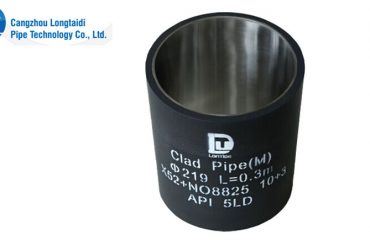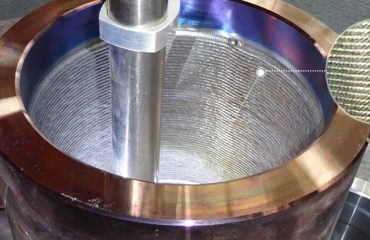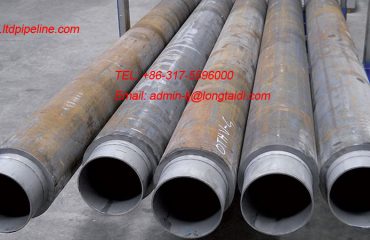Cladding refers to a process where a metal, corrosion resistant alloy or composite (the cladding material ) is bonded electrically, mechanically or through some other high pressure and temperature process onto another dissimilar metal (the substrate) to enhance its durability, strength or appearance. The majority of clad products made today uses carbon steel as the substrate and aluminum, nickel, nickel alloys, copper, copper alloys and stainless steel as the clad materials to be bonded. Typically, the purpose of the clad is to protect the underlying steel substrate from the environment it resides in.
Clad pipe is typically produced by cladding a low-cost carbon steel substrate with a corrosion-resistant stainless steel or nickel alloy, which costs a fraction of using a more expensive solid steel alloy for the entire product. For example, a solid nickel alloy pipe would cost about 5 times more than a carbon steel pipe that is clad with nickel alloy on its inside diameter.
corrosion resistant pipe which is telescopically aligned inside a pipe in carbon-manganese material and the tight mechanical bond between the pipes is achieved in a hydroforming facility.
For many years the Pipeline System pipes have been successfully used in very demanding and sensitive onshore and offshore areas of the oil and gas industry. They are used as pipelines, riser pipes and SCR-pipes for highly corrosive media.
Technical details at a glance:
Size range from OD 114,3 mm (4″) up to 660 mm (26″)
Random lengths up to 24 m (up to 12 m without circumferential weld)
Production acc. to API, ASTM, DNV or ISO
Suitable for S-Lay, J-Lay method, bundle or reel-lay process
CORROSION RESISTANCE OF 42%NI ALLOY
High CO 2 contents in aqueous liquids cause rapid weight loss type corrosion and the corrosion loss is increased as service temperature is high. The Cr content of the alloy is essential to improve the corrosion resistance in CO 2 or CO 2-Cl environments. Therefore, l3%Cr martensite stainless steel and 22%Cr or 25%Cr duplex stainless steel will be selected for use in such environment. The duplex stainless steel can be used for higher temperature service because of their higher Cr content.
The presence of H 2S causes sulfide stress corrosion cracking in martensite stainless steel and duplex stainless steel. Another effect of H 2S is to exacerbate chloride stress corrosion cracking (SCC) at high temperatures. On the contrary, high Ni alloys are generally characterized by good corrosion resistance in non-oxidizing acids and SCC resistance in Cl containing solutions at high temperatures.
:Cladding, Clad Pipe, Corrosion Resistant Alloy, CRA, corrosion, offshore, metallurgy

Nickle Alloy Corrosion Resistant Clad Pipes
Bimetal Pipe – Nickle Alloy Clad Carbon Steel Pipe
FOB Price: US $9,000-10,000 / PieceMin. Order: 1 Piece
Explosive Welding Nickle Alloy Bimetallic Clad Pipe
FOB Price: US $9,000-10,000 / PieceMin. Order: 1 Piece
Explosive Welding Nickle Alloy Bimetallic Clad Pipe
FOB Price: US $47-56 / kg
Min. Order: 100 kg
Inconel 625 Clad Pipe / Seamless Pipe / Welded Tube for Power General
FOB Price: US $47-56 / kg
Min. Order: 100 kg
Prime Quality 2014 Aluminum Alloy Pipe with Thick-Walled Tube
FOB Price: US $3,400-5,000 / Ton
Min. Order: 1 Ton
ASTM B241 Gr 5454 H32 Aluminum Alloy Seamless Pipe Supplier
FOB Price: US $3,400-5,000 / Ton
Min. Order: 1 Ton
2014 2024 TF Anodized Seamless Aluminium Tubing & Tooling Pipe
FOB Price: US $3,400-5,000 / Ton
Min. Order: 1 Ton
2024 T3 T4 Temper Silver Oval Anodized Aluminium Tube & Pipe
FOB Price: US $3,400-5,000 / Ton
Min. Order: 1 Ton
Customized 2014 6063 T5 Natural Anodized Extruded Aluminum Tube
FOB Price: US $3,400-5,000 / Ton
Min. Order: 1 Ton
Explosion Welding Stainless Steel Clad Carbon Steel Sheet for Offshore Oil Production
FOB Price: US $2,520-2,950 / Ton
Min. Order: 10 Tons
Uns N04400 Nickle Alloy Clad Pipe for Pressure Vessel
FOB Price: US $9,000-10,000 / PieceMin. Order: 1 Piece




You must be logged in to post a comment.